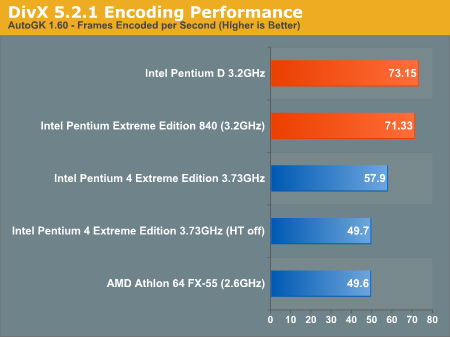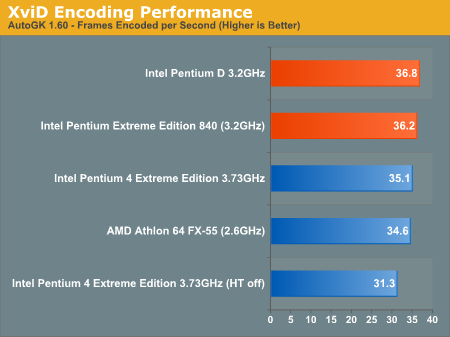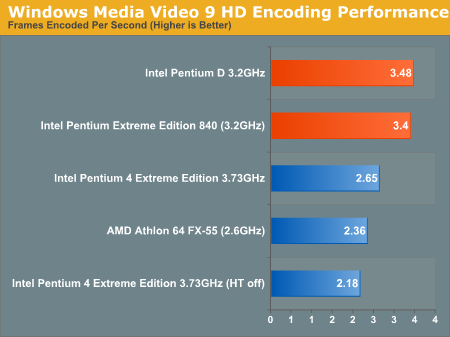Intel Dual Core Performance Preview Part I: First Encounter
by Anand Lal Shimpi on April 4, 2005 2:44 PM EST- Posted in
- CPUs
Encoding Performance
These new dual core CPUs are supposed to usher in a new era of media rich application usage models. They are supposed to enable us to do things that we were never able to do before. Let's find out if that's true or not...
First, we start off with iTunes to test MP3 encoding performance. We took a 12MB .wav file of our own creation and encoded it to a 192kbps MP3 file, measuring how long it took to encode the file.

Once again, we see that the Pentium Extreme Edition 840 is able to offer equal performance to the 3.73EE at 29 seconds. What's truly interesting is that the Pentium D running at 3.2GHz actually offers better performance than the Extreme Edition. We can only assume that 4 threads in iTunes begins to reduce performance, with 2 concurrent threads being the optimal point.
But once again, the performance gains aren't impressive. So far, dual core isn't looking too good.
DivX Encoding Performance
Our DivX tests from previous CPU reviews have shown a pretty sizeable improvement due to Hyper Threading, so we expected a similarly impressive gain due to dual core:

...and we were not disappointed. The Pentium Extreme Edition 840 offered more than a 20% increase in performance in our DivX encoding task when compared to the 3.73GHz single core P4 Extreme Edition.
We also see another example of four threads offering no performance improvement over being able to execute two concurrently, as the Pentium D running at 3.2GHz offers equal performance to the 840.
XviD Encoding Performance

The XviD tests show no real improvement due to dual core, but also don't seem to show much of an improvement due to Hyper Threading either. This just goes to show you that not all encoding tasks will show tremendous benefits.
Windows Media Video 9 Encoding Performance
Once again, we see extremely strong performance from the new dual core chips, offering around a 30% performance improvement at 85% of the clock speed of the current king of the hill.

So, overall encoding performance is pretty strong on the dual core chips from Intel. Let's have a look at one more multi-threaded application before we get to the more interesting tests.










141 Comments
View All Comments
johnsonx - Monday, April 4, 2005 - link
It looks like AMD better get busy. AMD woke up Intel from it's complacent slumber, and now Intel is going to start eating AMD's lunch. AMD has completely lost the 64-bit advantage, and will now lose whatever dual-core advantage it had by designing Hammer to be dual-core from the start. Prescott may or may not have been designed for dual-core, but it sure seems to work just fine, doesn't it?AMD's problem is that it talks about what it's going to do for too long before actually doing it, as if there isn't anything Intel can do about it. Intel surely can do something about it, and definitely has. This may be an obvious consequence of being a much smaller company: AMD doesn't have the resources to get things done as quickly as Intel can (when Intel is sufficiently motivated), but that just means AMD needs to keep their mouths shut for longer. AMD has been relegated to 'me-too' status for technologies they themselves were first with...
Object lesson for AMD: Intel can beat you to any launch date you set for any technology or feature you think you've got an exclusive on. Intel can then crush you with volume and market presence. It ain't fair... welcome to life.
AMD's best bet: whatever you set your launch dates to, surprise launch everything 6 months ahead of schedule. That'll only work a couple of times, but it's better than nothing.
Klober - Monday, April 4, 2005 - link
Two separate points here:First, I suppose dual-core may not improve single threaded application performance much over a single-core CPU with HT, but shouldn't it increase performance over a single-core CPU w/o HT? I would think it would allow the OS to run on one core while the application runs on the other core, which in theory should increase performance some. Just a thought, as I'm no expert on scheduling and the resources the OS actively requires.
Second point, a small simple application that may be useful in benchmarking, particularly in multitasking benchmarks, might be Macro Scheduler by MJT Net. It takes very little in the way of resources, and is very easy to program for starting applications, switching between them, taking screenshots, clicking on options and even typing whatever you'd like wherever you'd like. I think it could be a great base for switching between applications and starting processes inside those applications, all in a very repeatable manner. Timing can be down to the 1/10,000th of a second if need be, and using a scheduler with minimal resource impact would take the human element out of the benchmarking. Maybe you've already looked into this, or something similar, but it's just a thought that may make certain benchmarking situations easier for all of you that bring us these great (p)reviews.
Googer - Monday, April 4, 2005 - link
In Soviet Russia you post all you bad jokes Here:http://forums.anandtech.com/messageview.aspx?catid...
knitecrow - Monday, April 4, 2005 - link
yo dog, where the temperature at?but seriously, in addition to the usual suspects, I think anandtech should have compared pentium D to xenon 3.2ghz just to see the performance difference.
johnsonx - Monday, April 4, 2005 - link
ok, sorry... I posted my comment before reading the encoding benchmarks, where I see you did exactly what I suggested. My bad.vaystrem - Monday, April 4, 2005 - link
"2) Open iTunes and start playing the latest album of avid AnandTech reader 50 Cent on repeat all."? Really?
johnsonx - Monday, April 4, 2005 - link
I know it's nearly double the number of benchmarks to run, but it would have been instructive to see both Pentium processors benchmarked without HT as well. Testing the dual-core pentium EE without HT would of course mimic a 3.2Ghz Pentium D, and testing the single core P4 without HT would give us a baseline single-core, single execution thread reference.Finally, it might also be instructive to benchmark current P4 at 3.2Ghz, again both with and without HT.
Easy for me to say, I know, since I'm not the one who has to do all the benches....
LeadFrog - Monday, April 4, 2005 - link
I like the theory of if it can't get any faster lets just combine a few.SLI, RAID, and Dual Core CPU's.
segagenesis - Monday, April 4, 2005 - link
One site mentioned 125W power consumption. Ow.Well, its a start... but I want to see AMDs offering first.
msva124 - Monday, April 4, 2005 - link
This looks promising, I wonder if AMD might eventually cave and implement hyper-threading in their processors, in addition to dual core. Or is that not part of the cross licensing agreeement?